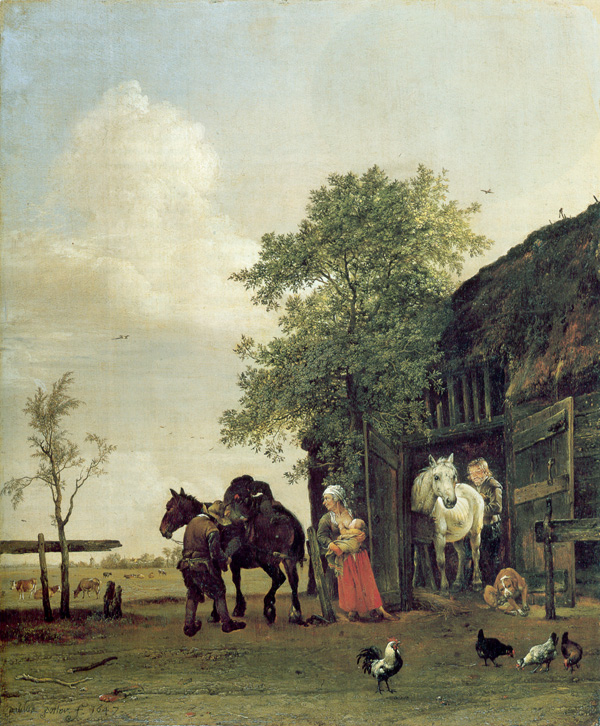Figures with Horses by a Stable
Paulus Potter1647
Oil on panel, 45 x 37.4 cm.
Philadelphia Museum of Art, The William L. Elkins Collection

Paulus POTTER
Enkhuizen 1625–Amsterdam1654
When Paulus Potter died of tuberculosis before he was thirty years old, he had already profoundly influenced the way animals are depicted in European art. Potter created portraits of animals, making them his picture's focus, not just a backdrop for human action. The precocious son of a painter, his first dated work is from 1640. He entered Delft's Guild of Saint Luke in 1646 and later moved to The Hague. He is said to have wandered the Dutch countryside, sketchbook in hand, equally sensitive to how farm animals behave at different times of day and to light's vicissitudes from morning to dusk. Few of his contemporaries were more attuned to nature's moods or to the timeless harmony of beast, landscape, and weather. Potter's strong feeling for composition is seen in the way he grouped forms and used silhouette. His most successful paintings are small.
His contemporaries recognized Potter's talent. The famous Dr. Nicolas Tulp, who had spotted the young Rembrandt van Rijn's genius twenty years earlier, persuaded Potter to move to Amsterdam in 1652, whereupon he became Potter's mentor. In the 1800s, Potter's life-size The Young Bull was as famous as Rembrandt's Night Watch. Potter's etchings show the same sensitivity as his paintings.
from:
The Getty
http://www.getty.edu/art/gettyguide/artMakerDetails?maker=262
- Willem van Aelst (2)
- Balthasar van der Ast (6)
- Hendrick Avercamp (3)
- Dirck van Baburen (7)
- Jacob Adriaenz. Backer (3)
- David Bailly
- Ludolf Bakhuysen
- Bartholomeus van Bassen
- Cornelis Bega
- Gerrit Berckheyde (2)
- Gillis Gillisz de Bergh
- Jan van Bijlert (7)
- Jan de Bisschop (2)
- Abraham Bloemaert (4)
- Pieter De Bloot
- Ferdinand Bol (3)
- Hans Bollinger
- Paulus Bor (2)
- Ambrosio Bosschaert (7)
- Jan Both
- Leonaert Bramer (4)
- Salomon de Bray (2)
- Quiringh van Brekelenkam (4)
- Jan Gerritszoon van Bronchorst (2)
- Adriaen Brouwer (5)
- Hendrick ter Brugghen (6)
- Hendrick van der Burch (5)
- Willem Buytewech (6)
- Abraham van Calraet (2)
- Jacob van Campen
- Jan van de Cappelle(3)
- Pieter Claesz (4)
- Pieter Codde (6)
- Adriaen Coorte (9)
- Josse van Craesbeeck (2)
- Aelbert Cuyp (6)
- Philip van Dijk
- Gerrit Dou (10)
- Willem Drost (2)
- Hendrick Dubbels
- Jacob Duck (4)
- Karel Dujardin (3)
- Willem Duyster (5)
- Gerbrand van den Eeckhout
- Pieter Jansens Elinga
- Cesar van Everdingen (5)
- Allaert van Everdingen
- Carel Fabritius (5)
- Goveart Flinck
- Frans Francken the Younger
- Aert de Gelder
- Cornelis Gijsbrechts
- Jan van Goyen (6)
- Frans Hals (3)
- Dirck Hals (5)
- Jan Davidsz. Heem (6)
- Maerten van Heemskerck
- Bartholomeus van der Helst (4)
- Jan van der Heyden (8)
- Meyndert Hobbema (3)
- Gerard van Honthorst (8)
- Pieter de Hooch (12)
- Van Hoogstraten (9)
- Gerard Houckgeest (4)
- Jan van Huysum (3)
- Willem Kalf (4)
- Jan van Kessel
- Philip Koninck (2)
- Gérard de Lairesse (5)
- Pieter Lastman
- Judith Jansdochter Leyster (5)
- Jan Lievens (4)
- Jacob van Loo (7)
- Nicolaes Maes (9)
- Cornelis de Man (5)
- Gabriel Metsu (12)
- Michiel Janz. van Mierevelt (3)
- Frans van Mieris (8)
- Jan Miense Molenaer (5)
- Pieter Molijn (2)
- Paulus Moreelse (2)
- Pieter Mulier
- Michiel van Musscher (5)
- Aert van der Neer (3)
- Eglon van der Neer (3)
- Caspar Netscher (5)
- Jacob Ochervelt (8)
- Jacob van Oost (2)
- Adriaen van Ostade (5)
- Antonie Palamedesz (6)
- Adam Pijnacker (5)
- Egbert van der Poel (2)
- Jan Porcellis (4)
- Pieter Symonz. Potter
- Paulus Potter (7)
- Pieter Jansz. Quast (2)
- Rembrandt van Rijn (complete oeuvre)
- Jacob van Ruisdael (8)
- Solomon van Ruisdael (7)
- Rachel Ruysch (2)
- Pieter Saenredam (3)
- Godfried Schalcken (6)
- Hercules Segers (2)
- Hendrick Sorg (4)
- Jan Steen (8)
- Harmen Steenwyck (3)
- Matthias Stom (2)
- Michael Sweerts (6)
- David Teniers the Younger
- Gerrit ter Borch (15)
- Willem van de Velde (7)
- Jacob van Velsen
- Johannes Verkolje (2)
- Jan Cornelisz Verspronck (4)
- Abraham de Verwer
- Simon de Vlieger
- Hendrick van Vliet (2)
- Daniel Vosmaer (4)
- Jacobus Vrel (8)
- Jacob van Walscapelle (2)
- Jan Baptist Weenix (2)
- Jan Wijnants (3)
- Emanuel de Witte (6)
- Philips Wouwermans (2)
 or anything else that isn't working as it should be, I'd love to hear it! Please write me at:
or anything else that isn't working as it should be, I'd love to hear it! Please write me at: